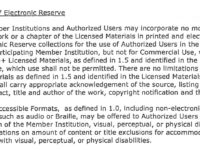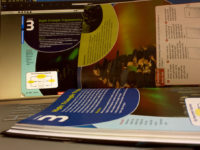The series on misleading on fair dealing continues with a post on transactional licensing and Access Copyright’s inexplicable opposition to a licensing system that currently generates millions of dollars in revenue for publishers and authors. Transactional licensing, which involves pay-per-use licences for specific uses not otherwise covered by institutional site licences, collective licences, or fair dealing, is widely used to ensure universities and colleges are compliant with copyright law (prior posts in the series include the legal effect of the 2012 reforms, the wildly exaggerated suggestion of 600 million uncompensated copies each year, the decline of books in coursepacks, the gradual abandonment of print coursepacks, the huge growth of e-book licensing, why site licences offer better value than the Access Copyright licence, my opening remarks to the Standing Committee on Canadian Heritage).
Post Tagged with: "copyright"
Misleading on Fair Dealing, Part 7: My Appearance Before the Standing Committee on Canadian Heritage
I appeared yesterday before the Standing Committee on Canadian Heritage via videoconference as part of its study on remuneration models for artists and the creative industry. The Heritage study is designed to provide additional context and information for the Industry committee’s copyright review. My opening statement is posted below. It focused on recent allegations regarding educational copying practices, reconciled the increased spending on licensing with claims of reduced revenues, and concluded by providing the committee with some recommendations for action. An audio version of the opening statement is posted here and embedded below.
Misleading on Fair Dealing, Part 6: Why Site Licences Offer Education More than the Access Copyright Licence
The series on misleading on fair dealing continues with a post on how to reconcile the data about which everyone agrees: education has spent more on licensing since 2012, but some copyright collectives (Access Copyright and Copibec) have generated less revenue (prior posts in the series include the legal effect of the 2012 reforms, the wildly exaggerated suggestion of 600 million uncompensated copies each year, the decline of books in coursepacks, the gradual abandonment of print coursepacks, and the huge growth of e-book licensing).
The issue was the focal point in the following exchange between MP Maxime Bernier and Copibec’s Frédérique Couette last May:
Canadian Government Commits $50 Million to Creative Commons Licensed Open News Content
The Canadian government announced plans last spring in Budget 2018 to support local journalism with a $50 million commitment over five years. It indicated that the money would be allocated by independent, non-governmental organizations to provide support in under-served communities. Last week, the federal economic update included several additional measures to support the media sector, including the prospect of charitable donations to non-profit journalism organizations, a refundable tax credit to support labour costs for news organizations, and a non-refundable tax credit for Canadians that subscribe to Canadian digital news media. While the new funding has attracted considerable commentary (my take here on why there are problems but the proposal is better than Internet taxes or other cross-subsidization models), somewhat overshadowed was an update on the initial $50 million commitment.
The update indicates that the money will be invested in “open source” news content that will be available under a Creative Commons licence:
Misleading on Fair Dealing, Part 5: The Multi-Million Dollar Educational Investment in E-Book Licensing
This series on misleading on fair dealing has placed the spotlight on the changing state of educational copying including the significant decline in book copying as part of coursepack materials and the gradual abandonment of print coursepacks in favour of digital course management systems (CMS). Other posts in the series examined the legal effect of the 2012 reforms and the wildly exaggerated suggestion of 600 million uncompensated copies each year.
This post highlights the massive education investment in e-book licensing. The shift to e-book licensing has significant implications for the fair dealing debate since it confirms that the decline of the Access Copyright licence is not the result of institutions seeking free access, but rather the gravitation toward alternative licences that offer better value for teachers, students, and the taxpayer.











